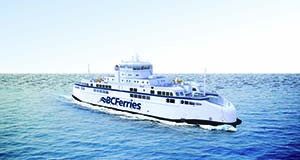ARCHIVE – BC & NATIONAL NEWS – July 2016
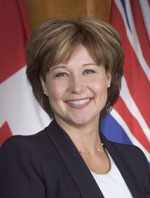 Friday, July 29 ~ VICTORIA. BC Day weekend is upon us, with Monday, August 1 being a statutory holiday. Premier Christy Clark issued the following statement on BC Day:
Friday, July 29 ~ VICTORIA. BC Day weekend is upon us, with Monday, August 1 being a statutory holiday. Premier Christy Clark issued the following statement on BC Day:
“We have a lot to celebrate this long weekend. British Columbia is a province of over 4.5 million strong, leading Canada like never before. It’s not just our lifestyle, the best food and drink the world has to offer, or the unparalleled natural beauty of snow-capped peaks, lush valleys, and the mighty Pacific Ocean.”
“Our province has become a place of inclusiveness and opportunity, where we aspire to a society where everyone feels welcome, from First Nations, to the most recent immigrants. A place where we recognize diversity is our greatest strength. We are uniquely blessed to call this magnificent place home.”
“This BC Day, I hope you have the opportunity to spend time with friends and family, and appreciate some of the things that make BC the envy of the world. I wish everyone a safe and happy holiday weekend.”
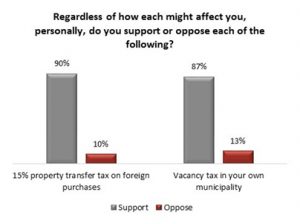 Friday, July 29 ~ VANCOUVER. Over eight in 10 (specifically 82%) polled about the scorching-hot real estate market in the BC lower mainland say the provincial government should have intervened in the housing market sooner, according to a poll this week by the Angus Reid organization. That includes three-quarters of those who voted for the BC Liberal Party in 2013.
Friday, July 29 ~ VANCOUVER. Over eight in 10 (specifically 82%) polled about the scorching-hot real estate market in the BC lower mainland say the provincial government should have intervened in the housing market sooner, according to a poll this week by the Angus Reid organization. That includes three-quarters of those who voted for the BC Liberal Party in 2013.
Of those polled, 90% support the tax on foreign buyers of Metro Vancouver homes, but doubt it will be very effective, it is stated in a news release this morning from the Angus Reid Institute.
The move by the BC Government to hastily impose a foreign-buyers tax (effective August 2, 2016) is being met with overwhelming approval in the Vancouver area, but with doubts over whether this and other policy changes will do much to bring housing prices down, according to Shachi Kurl of the Angus Reid Institute.
Another measure legislated by the BC Government this week will allow the City of Vancouver to tax vacant homes in its jurisdiction and 87% of those polled support that move.
And despite that it would mean all housing values would drop, 22% of current homeowners in the Metro Vancouver area said they hope that housing prices “fall significantly, by 30% or more” over the next few years. In total (homeowners and renters), 42% said they hoped housing prices would fall over 30% in the next few years.
The Canada Mortgage and Housing Corporation (CMHC) said on Monday this week (July 25) that “evidence of problematic conditions in Canada’s housing market as a whole has increased from weak to moderate since the last report”, according to their latest Housing Market Assessment (HMA). “In Vancouver, we now have sufficient evidence to raise our overall assessment of problematic conditions in the Vancouver housing market to high.” The HMA serves as an early warning system, alerting Canadians to areas of concern developing in our housing markets so that they may take action in a way that promotes market stability.
 Wednesday, July 27 ~ VICTORIA. The Malahat stretch of highway on Vancouver Island is getting another upgrade.
Wednesday, July 27 ~ VICTORIA. The Malahat stretch of highway on Vancouver Island is getting another upgrade.
The governments of Canada and British Columbia today announced approximately $34 million in funding to upgrade 5km of the Trans-Canada highway (Hwy 1) in the section known as ‘the Malahat’. “The project will contribute to a safer and more reliable connection between Victoria and Duncan,” says the BC Ministry of Transportation and Infrastructure in a news release today. “It will also benefit the surrounding communities by stimulating economic development opportunities.”
The safety improvements include expanding 5 km of highway to four lanes with wider shoulders, installing 3km of median barrier, and providing improved and safer highway access through a frontage road system. Work is anticipated to begin in early 2017 for completion in 2018. When the Malahat Village upgrade is finished, there will be an 11km-long section of highway with median barrier.
The federal government is contributing up to $14 million to this project through the New Building Canada Fund Provincial-Territorial Infrastructure Component – National and Regional Projects. BC is providing approximately $20 million and is responsible for any additional costs. The total estimated cost of the project is $34 million.
“The Government of Canada has made an unprecedented commitment of more than $120 billion for public infrastructure projects across Canada through the Investing in Canada plan,” says Amarjeet Sohi, BC Minister of Infrastructure and Communities. “By working in partnership with every order of government, we will make smart investments that promote sustainable development and long-term prosperity that will help foster a thriving middle class by creating jobs and opening the country to new economic, social and environmental possibilities. It’s thanks to initiatives like the Malahat safety improvement project that we will build 21st-century communities and ensure a high quality of life for generations to come.”
 “We recognize how important the Malahat is to the economy and communities on Vancouver Island, and we’ve been very clear about our commitment to improve safety for the families, communities and visitors who rely on it,” says BC Minister of Transportation and Infrastructure Todd Stone. “Through our valuable partnership with the Government of Canada, it’s great to move forward with the Malahat Village project, identified as the next priority in BC on the Move, which adds to the $33 million previously invested by the Province since 2001 on the Malahat.”
“We recognize how important the Malahat is to the economy and communities on Vancouver Island, and we’ve been very clear about our commitment to improve safety for the families, communities and visitors who rely on it,” says BC Minister of Transportation and Infrastructure Todd Stone. “Through our valuable partnership with the Government of Canada, it’s great to move forward with the Malahat Village project, identified as the next priority in BC on the Move, which adds to the $33 million previously invested by the Province since 2001 on the Malahat.”
The Malahat is well known for the number of vehicle crashes that occur there. The grade of the road is an issue in some places, as well as visibility in foggy and/or dark and wet conditions. Several crashes have resulted from one or more vehicles crossing over the centre line.
 Wednesday, July 27 ~ VICTORIA. A visit by British royalty has been hastily announced to be taking place this fall of 2016 in BC and Yukon.
Wednesday, July 27 ~ VICTORIA. A visit by British royalty has been hastily announced to be taking place this fall of 2016 in BC and Yukon.
Says BC Premier Christy Clark: “British Columbia is pleased to hear the Duke and Duchess of Cambridge have chosen to highlight British Columbia on their Royal Tour this fall. Like the Olympics, Women’s World Cup, Expo 86 and other international events, the Royal Tour will focus global attention on BC and showcase everything British Columbians take pride in, from our unmatched natural beauty to our thriving, diverse communities.
Details of the visit will become available in the months leading up to the arrival of Prince William, Duke of Cambridge (2nd in line to the throne) and his wife Kate Middleton, Duchess of Cambridge. It has not been announced yet whether their two young children — Prince George and Princess Charlotte — will be along for the trip.
This trip falls within 10 months of the next BC provincial election, coming up in May 2017.
 Tuesday, July 26 ~ OTTAWA. His Excellency the Right Honourable David Johnston, Governor General of Canada and patron of the Canadian Olympic Committee, will represent Canada at the Rio 2016 Olympic Games in Rio de Janeiro, Brazil from August 3 to 8, 2016.
Tuesday, July 26 ~ OTTAWA. His Excellency the Right Honourable David Johnston, Governor General of Canada and patron of the Canadian Olympic Committee, will represent Canada at the Rio 2016 Olympic Games in Rio de Janeiro, Brazil from August 3 to 8, 2016.
The Rio 2016 Olympic Games—the first Olympic Games to be held in South America—will be an opportunity for Canadian athletes to write another chapter in our country’s rich sports history. Our athletes, as well as their coaches and support staff, have demonstrated tremendous dedication and commitment to rise to a level where they are competing against the best in the world.
The Government of Canada is proud of its role in helping Canadian athletes realize their Olympic dreams. It is the largest single investor in Canada’s sport system, providing funding for initiatives that support our high-performance athletes and that promote sport participation among all Canadians.
• Canada has prepared one of its largest teams ever for an Olympic Summer Games with more than 315 athletes qualifying for Rio. For the first time, Canada has qualified in five team sports at the Olympic Summer Games.
• Through the Athlete Assistance Program, the Government provides approximately $28 million per year in direct monthly support to more than 1,900 of Canada’s top able-bodied and parasport athletes.
• The Rio 2016 Olympic Games will take place from August 5 to 21, 2016, and will include 10,500 athletes from 205 countries.
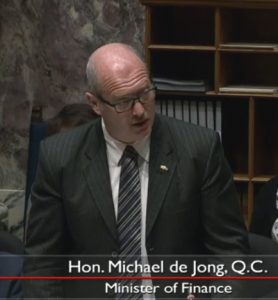 Monday, July 25 ~ VICTORIA. Legislation has been introduced this morning in the BC Legislature that would enable the City of Vancouver to deal with aspects of housing availability in BC’s largest city. Primarily, a vacancy tax that Vancouver wants to impose by local bylaw, would be allowed under the new legislation.
Monday, July 25 ~ VICTORIA. Legislation has been introduced this morning in the BC Legislature that would enable the City of Vancouver to deal with aspects of housing availability in BC’s largest city. Primarily, a vacancy tax that Vancouver wants to impose by local bylaw, would be allowed under the new legislation.
Introduced in the Legislature by BC Finance Minister Mike de Jong, the Bill is expected to pass this week.
The BC Legislature is in a hastily-called, short 4-day summer session, July 25 to 28. MLAs were called in from vacation in a relatively sudden move to deal with Vancouver’s rental housing crisis.
Apparently over 10,000 rental units could be freed up for citizens who are hard-pressed to find housing, by way of using the proposed new rental vacancy tax that Vancouver Mayor Gregor Robertson has pushed for.
Friday, July 22. Impaired driving on the waters is a criminal offence. With the Marine Festival beginning today, Nanaimo RCMP are reminding boaters to operate their boats safely. There will be increased RCMP patrols of the harbour and area this weekend.
West Coast Marine Section of the RCMP are recommending charges of impaired driving against one 31-year-old Nanaimo resident, who after tests results showed he was more than two times over the legal limit. He had been backed his boat trailer into the water in such a way that onlookers reported him as likely to be impaired.
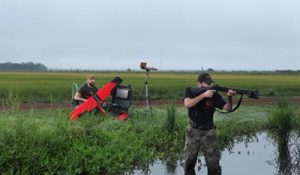 Friday, July 22 ~ VICTORIA. Regulations to ensure that hunters do not use flying drones to help them track wildlife have been strengthened in BC, said BC Minister of Forests, Lands and Natural Resource Operations Steve Thomson today.
Friday, July 22 ~ VICTORIA. Regulations to ensure that hunters do not use flying drones to help them track wildlife have been strengthened in BC, said BC Minister of Forests, Lands and Natural Resource Operations Steve Thomson today.
The Wildlife Act hunting regulation has been amended, making it now illegal for people to operate or possess a drone, or use data obtained by a drone, while on a hunting or trapping expedition. It is also now illegal for a third party to use a drone to help a hunter or trapper.
Before the change, Section 27 of the Wildlife Act made it illegal to use a helicopter to hunt in British Columbia, although the Province contended that drones were a kind of helicopter. The minimum fine for hunting with a helicopter or drone is $2,500 although a first conviction could cost a hunter $250,000 and up to two years in jail.
The BC Wildlife Federation, BC Trappers Association and Guide Outfitters Association of BC support the change.
“We have to make sure that our regulations keep pace with technology. These changes help ensure that the rules are in line with what most hunters already practise,” says Steve Thomson, BC Minister of Forests, Lands and Natural Resource Operations.
“Using drones to help track your prey just isn’t part of the hunting culture in British Columbia. Hunters are respectful of wildlife and their habitat and very supportive of the steps government is taking to prevent hunters from using drones,” says Jim Glaciar, president, BC Wildlife Federation.
“Hunters come to British Columbia to experience the wild and beautiful back country and participate in Fair Chase hunting. Drones undermine the experience people have come to expect when they hunt big game in this province,” says Scott Ellis, executive director, Guide Outfitters Association of BC.
Drones are small, remote or GPS-controlled aircraft that can be equipped to send digital images to the operator. a ban on hunters using drones is also in place in Alberta, Saskatchewan, Manitoba, Ontario, and Newfoundland and
Labrador.
More on hunting rules and regulations .
Wednesday, July 20 ~ VICTORIA. The BC government has passed a regulation which requires that all deaths that are the result of medical assistance in dying (MAiD) be reported to the BC Coroners Service.
Parliament last month changed federal legislation to permit medical assistance in dying in specific circumstances.
The federal government has indicated it will work with the provinces and territories to develop regulations ensuring the consistent reporting of MAiD deaths across the country. The regulation passed by the cabinet will ensure that in the interim all such deaths in BC are reported to the BC Coroners Service.
The role of the BC Coroners Service will be to ensure compliance with the federal and provincial laws and regulations, and also to gather information about MAiD deaths in BC for aggregate reporting purposes, says Barb McLintock, Coroner, Strategic Programs, BC Coroners Service.
The BC Coroners Service will work with the Ministry of Health to ensure all those involved are aware of the new requirements, says McLintock.
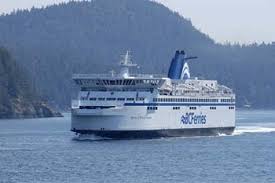 Monday, July 18 ~ VICTORIA. BC Ferries staff volunteered over a 10-day period this month to do shoreline cleanup. There were 20 cleanup events during July 6 to 16, in which more than 275 staff participated.
Monday, July 18 ~ VICTORIA. BC Ferries staff volunteered over a 10-day period this month to do shoreline cleanup. There were 20 cleanup events during July 6 to 16, in which more than 275 staff participated.
“As BC Ferries operates in a marine environment, our involvement in the shoreline cleanup is a natural fit,” said Corrine Storey, BC Ferries’ Vice President of Customer Services. “Our employees collected well over 1,500 kilograms of debris from the shorelines in and around the communities in which we operate. A few of the unusual items collected include a broken kayak, a shopping cart and a baby stroller.”
BC Ferries says that reducing its environmental footprint is a big priority. The three Salish-Class vessels currently under construction will be dual-fuel, so they can operate on natural gas. The two Spirit-Class vessels will be converted to dual-fuel, to run on the cleaner fuel source also. Using natural gas is anticipated to reduce greenhouse gas emissions by 15-25%, sulphur oxides (SOx) by over 85% and nitrogen oxides (NOx) by over 50%.
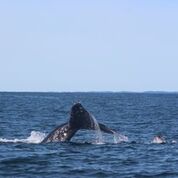 To illustrate its commitment to the marine mammals off our coast, BC Ferries says it was the first ferry operator in Canada to develop a policy and best management practices around the operation of vessels in the presence of marine mammals. This policy has been adopted by both Washington State Ferries and Alaska Marine Highway System. BC Ferries also records cetacean sightings through the BC Cetacean Sightings Network, which helps researchers fill data gaps on seasonal distributions of our coastal cetacean species. Cetaceans are a widely distributed and diverse mammal group of carnivorous, finned, aquatic marine mammals including whales and dolphins.
To illustrate its commitment to the marine mammals off our coast, BC Ferries says it was the first ferry operator in Canada to develop a policy and best management practices around the operation of vessels in the presence of marine mammals. This policy has been adopted by both Washington State Ferries and Alaska Marine Highway System. BC Ferries also records cetacean sightings through the BC Cetacean Sightings Network, which helps researchers fill data gaps on seasonal distributions of our coastal cetacean species. Cetaceans are a widely distributed and diverse mammal group of carnivorous, finned, aquatic marine mammals including whales and dolphins.
BC Ferries said today in a news release that the corporation is dedicated to safeguarding the environment and was recently recognized at the annual Green Marine conference as a top performer. Out of 100 participants, the company was recognized for achieving eight levels of improvement in performance indicators over last year’s evaluation. BC Ferries joined Green Marine in late 2014 and was certified by an independent verifier in May 2015. Green Marine is a globally recognized, voluntary, industry sustainability initiative for ship operators, ports, terminals and shipyards.
Friday, July 15 ~ OTTAWA. Prime Minister Justin Trudeau, has issued the following statement on today’s turbulent events in Turkey: “On behalf of all Canadians, I would like to express our concern about this evening’s events in Turkey. We call for restraint by all parties. Canada supports the preservation of Turkish democracy, and condemns any attempt to subvert Turkey’s democratic institutions by force of arms.
“The Government of Canada is being kept informed of developments in Turkey, and we are doing everything possible to ensure that the safety and security of Canadians in that country is maintained.”
Thursday, July 14 ~ WORLD. An intentional attack on an post-festivities evening crowd on the streets of Nice, France tonight leaves 84 people dead and about 200 now injured. At least 10 children are among the dead. The terrorism was invoked on unsuspecting Bastille Day partiers by a man intentionally driving a large truck into the crowd, then getting out and shooting at people to kill more.
A class of Nanaimo, BC middle-school students on a field trip to Nice, were about 30 meters from the deadly action, but none were physically harmed. School District 68 has called the trip short, and a counsellor has been sent to France to be with the students for the remaining days of their trip.
High-alert security has been extended in France for another three months. The high alert status was in place following a deliberate attack on people in a concert hall in Paris, several months ago. Before that, editorial staff at the office of a satirical publication Charlie Hebdo were gunned down in a deliberate attack in January 2015.
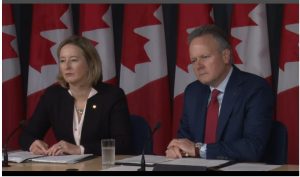 Wednesday, July 13 ~ OTTAWA. The Bank of Canada has held its benchmark interest rate steady at 0.5% today, at the same level it’s been at since last summer.
Wednesday, July 13 ~ OTTAWA. The Bank of Canada has held its benchmark interest rate steady at 0.5% today, at the same level it’s been at since last summer.
Some economists are saying the continued low rates are thought to be contributing to speculative housing markets in Vancouver/Victoria and Toronto.
Bank of Canada Governor Stephen Poloz and Senior Deputy Governor Carolyn Wilkins answered media questions this morning at a press conference in Ottawa.
In summary, they are predicting growth of 1.3% for 2016 (down from an earlier prediction of 1.7%) and that inflation will be ‘back on track’ by the end of 2017
The Governor and Deputy Governor expressed concern about the housing markets in Vancouver and Toronto, saying “the risk that it’s not sustainable is increasing”.
Most significantly, Wilkins emphasized that it’s really up to the confidence that businesses will have for investment, as to how quickly and to what degree the economy recovers. She admitted that in the recession “a lot of companies just disappeared”. Her prediction is that as older business owners slow down or retire, that new growth in the business sector will rely on younger entrepreneurs. Regarding existing companies: “Some are taking the plunge and starting to invest, some are taking a little more time,” said Wilkins. Longer term data is what frames business decisions, she explained.
What this says overall is that small and medium-size businesses are the cornerstone of an economic turnaround. It seems odd that the might of the overall Canadian economy relies on the decisions of the small and possibly under-funded small/medium independent business sector. Bottom line — economic recovery (and growth) has been and will continue to be all about investor confidence. That confidence is just not the same as it was in the pre-2008 era. It also seems odd that the Trudeau government is putting the squeeze to small and medium-sized business by earlier this year cancelling the reduction of the small business tax rate that the Conservatives had put into place to start in 2017.
Poloz said that the economic recovery has been “steady” for the past eight years since the crash and Great Recession that started in 2008. “We’re back to where we were in 2007, we’re almost there,” he said. Poloz seemed to imply that that was a good thing. However, 2007 preceded the crash of 2008.
 Monday, July 11 ~ VANCOUVER. The BC Government is working cooperatively and quickly to support the City of Vancouver with their pent-up challenge to maintain a reasonable vacancy rate in that city.
Monday, July 11 ~ VANCOUVER. The BC Government is working cooperatively and quickly to support the City of Vancouver with their pent-up challenge to maintain a reasonable vacancy rate in that city.
In a media announcement this morning, BC Finance Minister Mike de Jong said that the legislative authority allowing the City of Vancouver to levy a vacancy tax will be dealt with in a special sitting of the BC Legislature on Monday, July 25.
This announcement follows in the path of other recent announcements by Premier BC Christy Clark regarding a determined desire by the BC government to effectively deal with a skyrocketing real estate market in BC’s largest municipalities. The upward thrust of housing prices in BC has been fueled, in part, by foreign buyers who bring financial resource from outside the Canadian marketplace.
On June 29, Premier Clark announced that the BC government accepted all 28 real estate industry recommendations from an independent advisory panel, most notably that the Real Estate Council of BC would no longer be self-regulated. “Our conclusion is that the privilege of self-regulation in the BC real estate industry must end,” said Premier Clark.
While the BC Government is finally now putting a high priority on dealing with housing availability and affordability, it has been over 20 years that this problem has been compounding, especially in the Greater Vancouver area and to a lesser but still significant degree in the Greater Victoria area on Vancouver Island. In general, Realtors kept selling to whomever had the money to buy, without regard for greater market fairness to moderate-income households or for the impact that pushed-up prices would have on the overall affordability of housing and the well-being of communities.
With legislative authority to implement a vacancy tax, Vancouver “won’t have to camouflage it is a business tax” says Finance Minister de Jong.
The BC Finance Minister says he is open to seeing other communities come forward to similarly request changes to their community charters, whether to levy a vacancy tax or perform other measures to support housing availability and affordability.
Monday, July 11 ~ After more than a year of public consultation, BC Ferries is announcing new 2017 sailing schedules for the Southern Gulf Islands routes –– Salt Spring, Galiano, Pender, Mayne and Saturna. The schedules take effect in May 2017, and full details can be found at bcferries.com .
“The development of these schedules was made possible due to the upcoming introduction of two new, natural gas-fuelled Salish-Class vessels into service in the Southern Gulf Islands in 2017,” says BC Ferries. The Salish Eagle and Salish Raven are the two new vessels.
“This provided an ideal time to revisit sailing schedules for the area to better align customers’ needs, while balancing capacity with demand and the seasonality of ferry travel with two identical sized vessels. The new schedules allow for more capacity in peak periods when demand is higher and less capacity in the off-season when demand is lower.”
Highlights of the new schedules between Tsawwassen [mainland at Delta / Vancouver] and the Southern Gulf Islands include:
• In the peak season, there will be more sailing opportunities and an increase in capacity of approximately 45%.
• In the peak season, there are more direct sailing opportunities on the weekends while maintaining inter-island connections on weekdays.
• Pre- and post-summer shoulder seasons with two-ship operation to start at the beginning of May and finish on the Thanksgiving long weekend.
• Off-peak schedules remain similar to current service with additional sailings on busy days and new timings to facilitate connecting sailings.
Highlights of the new schedules between Swartz Bay [Vancouver Island at Sidney/Victoria] and the Southern Gulf Islands include:
- Swartz Bay to Southern Gulf Island service has been optimized to work with the new Salish Class vessels.
- Adjustments to the schedule during the busier months will help in maintaining on-time departures and arrivals.
- The larger vessel will stop more often at ports where there is greater demand.
- Departure times have been adjusted to allow for Tsawwassen connections.
A pilot program for Thru Fare customers (Tsawwassen travellers going via Swartz Bay) was introduced to improve the connectivity to Southern Gulf Island ferries. Early indications are very positive and the pilot will further enhance travel opportunities for customers.
Dangerous Cargo sailings have been scheduled year round on Sunday mornings with no seasonal changes that disrupt Monday and Wednesday travel.
Over the past year, BC Ferries conducted a public consultation process to review schedules between Tsawwassen and the Southern Gulf Islands. This process included surveys, public meetings and small working group sessions with local community representatives. “Trying to balance the competing wants and needs of five islands is a challenge and required careful consideration before making any adjustments,” it was stated in a BC Ferries news release today.

Sunday, July 10 ~ National. Today Canada Post dropped their threat of a worker lock-out that was to start on Monday July 11.
Canada Post issued a brief statement today, saying it had withdrawn its lockout notice “which will allow both parties to focus their efforts on serious negotiations.”
Talks resumed. But a strike could still happen, if the union tips in that direction.
“We are also expecting the union to honour their repeated public statements that they have no plans to issue a strike notice,” the Canada Post statement said. “Assurance from both parties that the postal system will remain open for business while we negotiate will provide the certainty that Canadians and our employees are looking for.”
The Canadian Postal Workers Union (CUPW) say on their website that they “continue to be opposed to interest arbitration”, i.e. binding arbitration that would force them to accept the position of a 3rd-party decision maker.
The dispute between employer (Canada Post) and employees (CUPW) primarily involves these issues, heaped upon a difficult history of dispute resolution between the two parties:
- The two sides have been negotiating over the last seven months, including 60 days of conciliation talks and more than 30 days with federal mediators.
- The union wants changes in how rural and suburban mail carriers are paid. They want to be paid by the hour, like urban letter carriers, not by how many packages they deliver.
- Canada Post says it wants to change its pension plan, bringing it in-line with the private sector. It wants new employees to be covered under a defined contribution plan instead of a defined benefit plan. (Defined contribution plans reduce costs for companies and shift the risk for future payouts to employees, who are no longer guaranteed a set payment in retirement. This is seen by the union to be bad for incoming younger workers.)
Due to the uncertainty produced by the pending strike, mail and package volume was down by 80% last week, says Canada Post.
 Saturday, July 9 ~ National. A postal strike is still possible. While a 30-day cooling off period was proposed by the Canadian Union of Postal Workers (CUPW), they subsequently did not agree to Canada Post’s response of ‘agree to binding arbitration’ if negotiations didn’t work out after 30 days.
Saturday, July 9 ~ National. A postal strike is still possible. While a 30-day cooling off period was proposed by the Canadian Union of Postal Workers (CUPW), they subsequently did not agree to Canada Post’s response of ‘agree to binding arbitration’ if negotiations didn’t work out after 30 days.
Therefore, technically speaking, there could still be a postal strike starting as early as Monday, July 11.
The federal government has said they will not impose back-to-work legislation in this dispute.
 Friday, July 8 – VICTORIA. Island Health has uncovered another privacy breach, similar in nature but separate from the two reported on June 14 which involved two employees. This latest breach involves an employee who viewed the records of 34 individuals who received services from Island Health.
Friday, July 8 – VICTORIA. Island Health has uncovered another privacy breach, similar in nature but separate from the two reported on June 14 which involved two employees. This latest breach involves an employee who viewed the records of 34 individuals who received services from Island Health.
Island Health President & CEO Dr. Brendan Carr expressed his frustration with what he calls a gross breach of patient, client and public trust, and again sincerely apologized on behalf of the organization.
“Our employees know it’s wrong to look at the private health information of patients when they have no legitimate reason to do so,” he said. “It saddens and disappoints me that the actions of a very, very small minority of our 19,000 staff violate the values and high ethical standards we all work towards at Island Health. Our patients deserve better.”
Island Health launched an investigation after an audit confirmed this individual used access privileges to view the records of patients with whom there was no care or service relationship. Steps were taken immediately to ensure the access to personal or confidential information of the employee was revoked, and the BC Office of the Information and Privacy Commissioner (OIPC) was notified.
Island Health is in the process of notifying all individuals impacted, all of whom are from Vancouver Island. The employee was based in Victoria and no longer works for Island Health.
This leaves the public wondering as to what might be driving these health record privacy breaches. Factors might include Insufficient or outdated training, combined with a corporate culture that has somehow eroded from previous standards. If there is some financial or personal benefit from inappropriately acquiring the info, this is a strong force to be reckoned with. Some stringent new restrictions will likely be required… whether that is through computer software and/or how authorized access is issued.
![]() Friday, July 8 ~ VICTORIA. A postal strike has been averted for now. Canada Post and the Canadian Union of Postal Workers have decided to keep talking. The ‘cooling off period’ is set for 30 days. If an agreement is not reached by the two sides, then binding arbitration — instead of a service interruption — has been stated as a goal.
Friday, July 8 ~ VICTORIA. A postal strike has been averted for now. Canada Post and the Canadian Union of Postal Workers have decided to keep talking. The ‘cooling off period’ is set for 30 days. If an agreement is not reached by the two sides, then binding arbitration — instead of a service interruption — has been stated as a goal.
Meanwhile, in the past week, Canada Post has lost significant revenue. The volume of mail and parcels through their system has dropped across the country.
The groups that would be most significantly affected by a full service interruption are generally thought to be any seniors and others who still incorporate ‘snail mail’ into their lifestyle. Even more so, any small businesses that rely on delivery of ad mail or packages would be impacted in a direct way by a strike.
Shifting to e-mail, e-delivery and the use of on-ground couriers has been a work in progress for years, even more so when there’s threat of a postal strike. In general, people prefer to avoid conflict and will just find other options and get on with their business.
 Thursday, July 7 ~ VICTORIA. OPINION-EDITORIAL “Improving access to provincial campgrounds” submitted by Mary Polak, BC Minister of Environment
Thursday, July 7 ~ VICTORIA. OPINION-EDITORIAL “Improving access to provincial campgrounds” submitted by Mary Polak, BC Minister of Environment
“I completely understand the frustration people feel when they are unable to reserve a campsite in one of our provincial parks. You’ve booked some vacation time, or maybe have simply left work early on a Friday to get a jump on the weekend. You would like to kick back with friends or family away from the bustle of the city, but your favourite campground you’ve visited over the years is full.
The very features we all love about provincial parks, namely spectacular wilderness close to where we live, is also causing a problem for some people and families. There are simply too many people chasing too few campsites. There are fewer than 6,000 reservable campsites in BC.
The ultimate solution is to increase the supply of campsites, but that will take some time. Availability of land in high-demand areas is one challenge but, as well, for everyone who wants to see expanded campsites for recreational purposes, you have another person who says, “No, I don’t want you to cut down more trees.”
We will address that, but in the meantime, we are also making sure the campsite reservation system is doing its job as effectively and efficiently as possible. We know British Columbians want a reservation system that is fair, that they have just as good a chance of securing a campsite as the next person. Every year we make changes to improve the Discover Camping system to ensure it is fair and every year some people find new ways to circumvent the system. We are working closely with our reservation service provider to determine what changes can be made for next year to close loopholes.
While our main challenge centres around supply and demand, we take any allegations of unfair reservation practices very seriously. Of the 131,000 reservations made so far this year, the public has informed us of only a couple dozen incidents of people attempting to re-sell reservations. We followed up on all of those to make sure all ads have been removed or reservations cancelled. BC Parks also monitors social media sites for advertisements about re-selling reservations.
For the last five years, about three-quarters of reservations through Discover Camping have been made by British Columbians. No one, including commercial operators, is given preferential treatment to reserve campsites and the system does not allow block campsite reservations.
Last year, fewer than 800 reservations, or well under 1% of the more than 158,000 bookings, were made by commercial operators. And for the most part, these companies booked short stays of two days or less, with the majority occurring Sunday through Thursday.
Some ideas we are considering to improve the reservation system include: adjusting the reservation opening dates; lengthening the three-month rolling reservation window; and shortening the maximum stay in high-demand parks from 14 days to seven days, in order to provide more camping opportunities.
All options will be carefully considered to make sure we don’t negatively impact the majority of our users, while trying to solve a problem that is only being abused by a handful of reservation holders.
We are working hard to ensure everyone has fair and transparent access to our coveted camping opportunities across British Columbia and positive camping experiences in BC Parks.”
 Thursday, July 7 ~ VICTORIA. The BC Government has released real estate transaction data today resulting from new measures to track the extent of foreign real estate transactions in British Columbia.
Thursday, July 7 ~ VICTORIA. The BC Government has released real estate transaction data today resulting from new measures to track the extent of foreign real estate transactions in British Columbia.
In many ways, it’s a bit late in the game, as foreign buyers have been gobbling up good real estate in the Lower Mainland in particular for over 10 years. Housing affordability for local average income earners has been challenged as a result over time, as the housing prices have increased exponentially year after year. Many Realtors in urban areas have gained substantially from this trend over the years, selling away prime properties at the expense of BC residents and young families.
The data released today by the BC Government is drawn from the filings of Property Transfer Tax forms by purchasers of residential real estate in BC between June 10 and June 29, 2016. “The data represents a first, early look at the rate and value of purchases of residential property by foreign nationals-people who are neither Canadian citizens nor permanent residents,” says the BC Ministry of Finance in a release today, July 7.
Main findings include, between June 10 and June 29, 2016:
- 10,148 residential real estate transactions in BC, totalling more than $7.6 billion.
- 337 transactions (3.3%) involved foreign nationals, worth $390 million (5.1%).
- In Metro Vancouver, there were 5,118 transactions worth nearly $5.4 billion, of which 260 involved foreign nationals (5.1%), worth $351 million (6.5%)
- In the City of Vancouver, there were 1,139 transactions, totalling more than $1.6 billion. 47 of these involved foreign nationals (4.1%), worth $64 million (3.9%).
Government has released additional data on Richmond, Surrey, Burnaby and the Capital Regional District in south Vancouver Island. Further updates will be available.
![]() Tuesday, July 5 (updated July 6) ~ Canada Post has issued a lockout notice against its unionized employees, with the required 72-hours notice. The soonest a work interruption can occur — stopping mail delivery — is now Monday, July 11 (was previously Friday, July 8).
Tuesday, July 5 (updated July 6) ~ Canada Post has issued a lockout notice against its unionized employees, with the required 72-hours notice. The soonest a work interruption can occur — stopping mail delivery — is now Monday, July 11 (was previously Friday, July 8).
Reportedly, mail volumes have already significantly declined this week, as the possibility of work stoppage loomed as early as Monday, July 4.
Every time there has been a postal strike in Canada, more mail consumers have switched to using couriers and certainly now to the option for digital communication.
A key sticking point in negotiations involves changes to employee pension plans. Essentially, the mail service wants to switch new hires to a defined contribution plan, where payouts are not guaranteed. That’s different from the defined benefit plan that current members get, which guarantees a fixed benefit regardless of investment returns, similar to CPP.
Canada Post claims it is responsibly responding to the changing realities of how it can remain financially viable in the digital age.
 Tuesday, July 5 ~ WEST SIDE of SOUTH VANCOUVER ISLAND. Nothing else in the Canadian economy has skyrocketed upward in price like the price of housing in BC, particularly in the Lower Mainland and the south Vancouver Island area.
Tuesday, July 5 ~ WEST SIDE of SOUTH VANCOUVER ISLAND. Nothing else in the Canadian economy has skyrocketed upward in price like the price of housing in BC, particularly in the Lower Mainland and the south Vancouver Island area.
Clearly the action of market speculation by those of resource has occurred in the hottest market areas, as there is no sensible economic factor for housing price increases that are far outstripping the currently very low rate of inflation.
In the overall Greater Victoria area, the benchmark (data adjusted) price for single-family homes in all map areas was 14.4% higher in June 2016 compared to one year ago. When the actual sales are tallied and averaged out over the number of sales, the actual average sale price of a house in Greater Victoria was $758,146 in June 2016 — which is 21.7% higher than the $593,700 benchmark that the Victoria Real Estate Board (VREB) likes to promote.
For the western communities focus of this publication (Langford, Colwood, Sooke), the average actual sale price was $540,075 in June 2016, which is 12.4% higher than the benchmark of $473,333 for that area. The benchmark (House Price Index or HPI) is a data-adjusted figure to incorporate factors that the VREB considers influential on a buying decision and/or livability in that area, including proximity to services, recreation offerings, and proximity and range of schools.
The three western communities of Langford, Colwood and Sooke saw a total of 181 sales in June 2016. That represents 30.9% of all 585 sales in Greater Victoria last month. Due to the relative affordability of this region — being somewhat away from the core (Victoria, Saanich, Oak Bay), sales are strong.
- In Langford the actual sale average of $491,579 (91 sales) is 21.3% higher than the benchmark promoted by VREB. For some reason, the HPI factors are making Langford housing prices appear (on first blush) to be lower than they really are.
- In Colwood the actual average of $588,868 (34 sales) was 12.1% higher than the benchmark. This HPI percentage is on par with that of overall Greater Victoria.
- In Sooke the actual average of $439,777 (56 sales) is 13.0% higher than the benchmark. The HPI level of $382,700 makes Sooke sound more affordable than it really is. Factors to push down the HPI figure would include travel-distance to major services.
For the sake of people who already own homes, it would be favourable for the market not to ‘correct’ (drop significantly or crash). For the sake of people who can only dream of being able to afford a home, the BC Government says it aims to improve affordability in the months ahead.
![]()
Monday, July 4 ~ NATIONAL. Still no postal strike. Talks between Canada Post and the CUPW union that represents postal workers are continuing. Canada Post told media that they still hope to negotiate a deal. That would avert a disruption of service.
As of this morning (Eastern Time), Canada Post has not given the required 72 hours notice of a lockout. As well, the union has not given notice of any job action, despite having a strike mandate from CUPW members.
As of today at noon (EDT), that notice had not been given, which puts the timeline for a work stoppage on Thursday, July 7 at the earliest.


